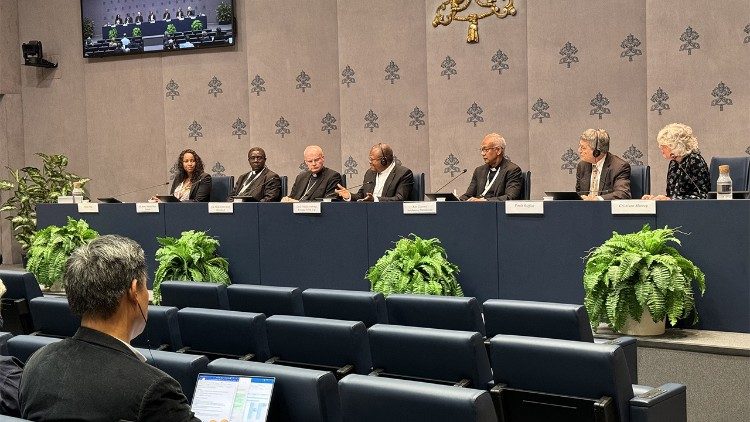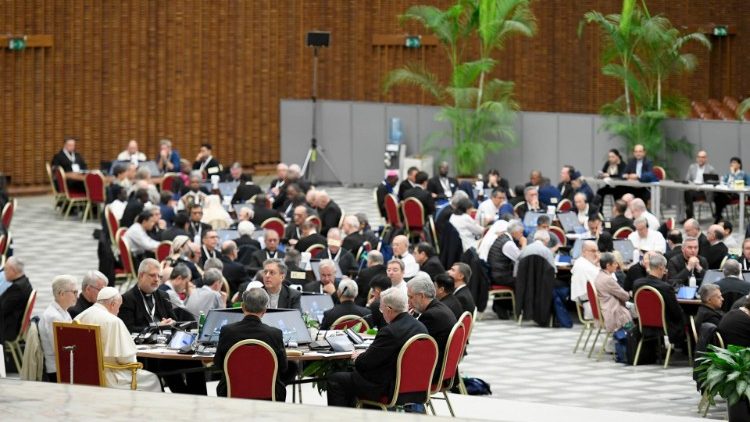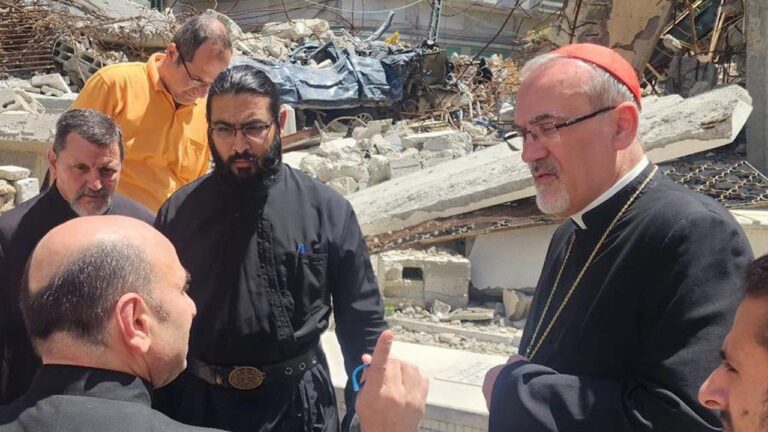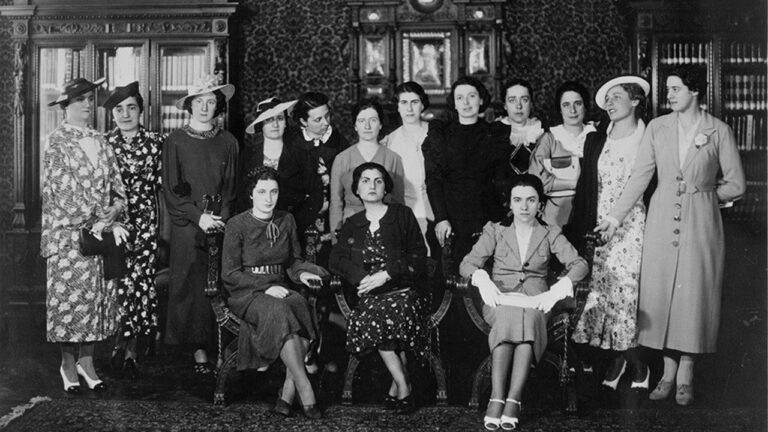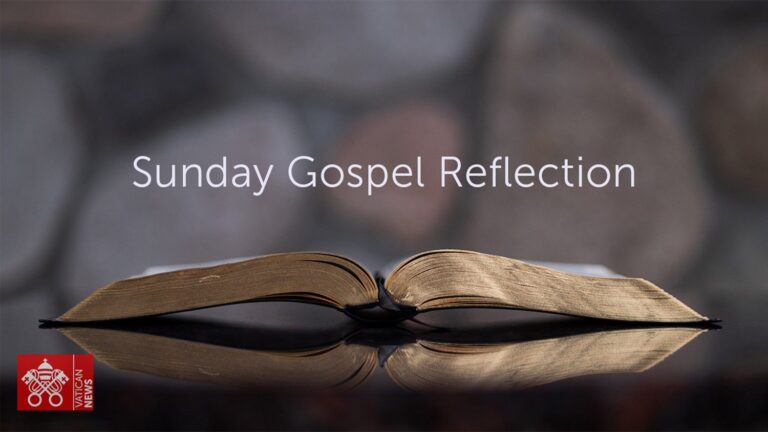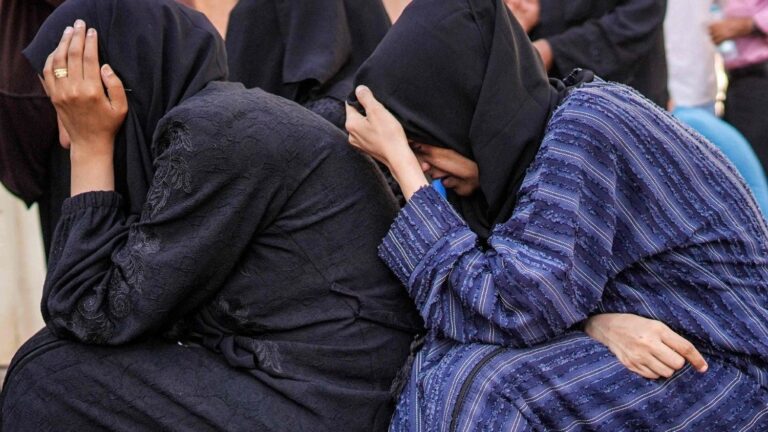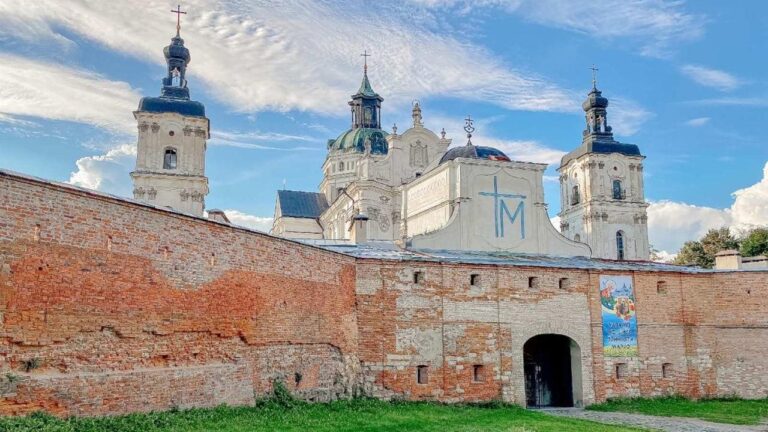Synod briefing – Day 16: Discernment on the final document
The topics of the role of young people and women in the Church were among the major themes during the discussions of Synod participants on the final document of the Synod, which is to be approved at the end of the General Assembly on Saturday. Participating in Tuesday’s press conference were Cardinal Fridolin Ambongo Besungu, archbishop of Kinshasa, DRC; Archbishop Andrew Nkea Fuanya of Bemanda, Cameroon; Bishop Franz-Josef Overbeck of Essen, Germany, and Father Clarence Davedassan of Malaysia.
By Lorena Leonardi and Edoardo Giribaldi
The last days of the General Assembly of the Synod on Synodality are a time of discernment on the draft Final Document, the participants proposing fashionor amendments to the draft text; while remaining attentive to what is happening in the world with the proposal of a “strong and clear no” to war.
The work of the Synod participants was described, as usual, at the start of the Synod’s daily press briefing by Dr. Paolo Ruffini, President of the General Assembly Information Commission; and Sheila Pires, Secretary of the Commission.
The development of fashion
“The next few hours, this afternoon and tomorrow morning, will be devoted to developing in small groups the fashion to the draft final document,” explained Ruffini. He noted that “at the end of the morning, the special secretary, Father Giacomo Costa, explained in detail the modalities of this new phase of work.”
In particular, Ruffini explained that “modi” “are concrete proposals for modifications” to the text, whether by elimination, addition or substitution. Additionally, he added, proposed amendments can be submitted either by individuals or by groups of Synod participants: Collective fashion are those adopted in linguistic groups. Each proposed amendment will be voted on separately by the full members of the Synod, with an absolute majority necessary for an amendment to be adopted.
The goal is to arrive at collective modifications that express the discernment of the group. Furthermore, continued Dr. Ruffini, “the collective fashion must be delivered late tomorrow morning.
Each member can also send individual proposals to the General Secretariat of the Synod; however, the fashion “will naturally carry more weight.”
Translations of the document into Ukrainian and Chinese
Finally, Dr. Ruffini emphasized “that the draft Final Document was written in Italian, as the official language, but that it was translated into as many languages as possible with unofficial translations. All this was done to facilitate the discernment of the different members. He highlighted that Ukrainian and Chinese are among the languages into which the text was translated, being “highly appreciated” by the two Chinese bishops present at the Synod.
Call from young people “we want to walk with you”
Dr. Pires said 343 synod members were in the room for Tuesday’s General Congregation, which was also attended by Pope Francis.
After the small group meetings that followed the presentation of the draft final document on Monday, “this morning (Tuesday) all free speeches focused on the draft document. The text was appreciated for its balance, its depth, its density and, at the same time, proposals were made.
“There have been 40 interventions on the different subjects linked to synodality discussed so far,” noted Pires, specifying: “Among these was the theme of young people: with a request from one of the youngest members of the Synod which appealed to synodal fathers and mothers with a view to the post-Synod: “Please, do not leave the young people aside but walk with us; we want to walk with you.”’
The different roles within the Church
“Other interventions,” Pires reported, “spoke of the role of women in the Church, reaffirming their fundamental importance; then the role of the laity, episcopal conferences, priests, consecrated life and small Christian communities.
The secretary of the Information Commission concluded by emphasizing that world news was entering the Synod hall, with the invitation to the Church to reiterate “a strong and clear ‘no'” to war: “We must continue to ask and implore an end to these conflicts,” we heard in the room; “otherwise there will be no human being alive who can read this document. »
Imagine a new way of being Church
“We were convened not to solve particular problems but to imagine a new way of being Church,” said Cardinal Fridolin Ambongo Besungu, the first of the panelists to speak at Tuesday’s briefing. “The Synod did not deviate from the objective it had set for itself, by laying the foundations: from there, by bringing everyone back to their home, as well as to the universal Church, we must apply this spirit of synodality to each problem that arises. “, he said.
The Archbishop of Kinshasa expressed his satisfaction with the Synod which is coming to an end.
“Our country is still considered a missionary land, our Church was until recently a missionary land and it must adapt to the reality of the socio-cultural context,” he declared, which is why “the convocation to synod was seized as a kairós, a moment of grace, and an opportunity to “see together how to imagine a new way of being Church”.
Now that synodality is emerging in the Church, Cardinal Ambongo assured journalists that in Africa, the Church, “with our African brothers and sisters, will try to enter into this new dynamic, how to be a Catholic Church differently” .
Africa, fertile ground for synodality
Mgr Andrew Nkea Fuanya, Archbishop of Bamenda, Cameroon, then spoke, commenting on the African contribution to the Synod, starting with the grassroots communities and catechists.
Synodality, he said, is “an eschatological sign for all of us,” who come from different parts of the world with different ideas.
He expressed the hope that the synod participants would return home not only as people who had passively received synodality, but also as active ambassadors” of synodality, which, he continued, “is truly, in my opinion, the future.”
In the context of Africa, where “the churches are full”, the problem is “how to keep them” full, he stressed, adding: “We will do it through synodality”.
The Archbishop then highlighted the fundamental role played by catechists, particularly women, who represent approximately half of the total number of catechists.
“Africa is a privileged place for synodality”, so much so, he concluded, that “in small communities we manage to solve problems and have peace”.
Reinculturating Catholicism in the era of post-secularization
Speaking about the post-secularization situation in Germany, the Bishop of Essen, Franz-Josef Overbeck, stressed the need for a re-inculture of the Catholic Church.
“After many years of being Catholic or Protestant, today out of nearly 84 million inhabitants, half are without faith, without religion and also without idea of who God is,” he declared , “while the other half is almost equally divided between Catholics and Protestants, with the presence of more than four million Muslims. Even if new small communities are working, it is necessary to “re-evangelize” and at the same time “give a new answer on the role of women in the Church”.
In this state of post-secularization, in which the Church lives “in tension between the structure on the one hand and a new spirituality on the other”, synodality is “a path that we have already been traveling for years”, he said. continued the Bishop. , adding that a synodal approach has already been developed after the abuse scandal in Germany.
Asia, a living faith in dialogue
Father Clarence Sandanaraj Davedassan, director of the Catholic Research Center in Kuala Lumpur, Malaysia, spoke about the experience of living synodality intra announcementwithin the Church; And additional announcementwith others.
Aside from the Philippines and Timor Leste, he explained, Asia is a continent where Catholics are a minority.
Even though the faith is alive and well, he said, “that doesn’t mean secularization and other problems aren’t present.”
If, he continued, “the public space for the expression of faith seems to become more and more restricted” in many places, notably because of political and religious extremism, in such a context “ we must seek harmony by engaging in dialogue.”
In such a context, he insisted, dialogue “is not an option” but rather “a question of survival”. This is not a novelty but a necessity and is part of the experience we live daily within a pluralistic culture.
Synodality, he continued, is “at the basis of all this” and it is experienced everywhere, starting with the family, and it continues to bear fruit.
So, he said, the challenge in Asia is to learn to do theology “from the perspective of living with others” and to learn to evangelize “where faith cannot be expressed in a public way.” .
Finally, Father Davedassan spoke about the phenomenon of migration, which has led many Asians to live in other parts of the world: “They are the new missionaries, because when they leave, they are not only looking for an income but they take their faith with them.” he concluded: “And I know that in many places around the world they animate the Churches, helping to keep the faith alive.”
